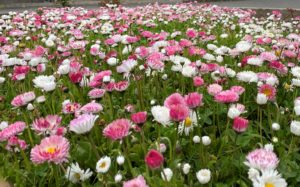June is Pollinator Month, which is good news for the birds, bees and beneficial insects that are drawn to Burgerville’s many meadows.

Brandon Wilson, account manager for DeSantis Landscapes, who oversees the Burgerville landscape maintenance portfolio, says the eco-lawn is a perfect fit. The restaurant’s sustainable approach to locally-sourced products, healthy food and regional vitality is well-suited to supporting the health and well-being of the Pacific Northwest’s pollinator population.
Pollinator Month celebrates the interdependency of wildflowers and pollinators, and DeSantis supports this approach by encouraging the planting of native, non-invasive pollen and nectar producing plants.
“We know our clients want beautiful landscapes and for those who also want to do something more, lawn alternatives provide the forage pollinators need to fertilize plants and crops,” said Brandon.
The loss of bee populations pose a risk to ecosystems due to the loss of high-quality habitat. Eco-lawns, honeybee meadows, and clover mix groundcovers, when maintained organically, provide collective benefit to pollinators at the local level.
One of the great benefits of non-traditional lawns is their contribution to biodiversity within the landscape. Even for clients who aren’t ready to turn over their entire manicured lawn to pollinators, areas like slopes, easements and underused outdoor spaces can be transformed with a wildflower/herb seed mix.
DeSantis has been working with Burgerville to transition its available turf space to Fleur de Lawn, a branded seed mix from ProTime Lawn Seed, an Oregon-certified Women Business Enterprise.
Drought tolerant, low-maintenance and resilient, Fleur de Lawn was developed in partnership with Oregon State University and combines ryegrass, fescue, Strawberry Clover, Baby Blue Eyes, Sweet Alyssum, and English Daisy.
To learn more about DeSantis’ landscape practices that support wildlife and healthy ecosystems, go to: www.desantislanscapes.com

